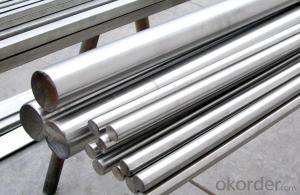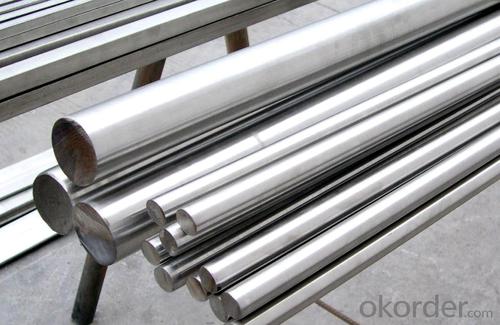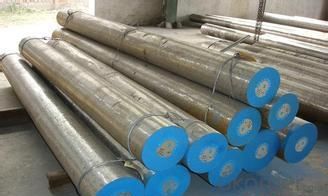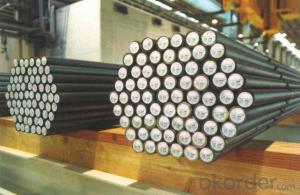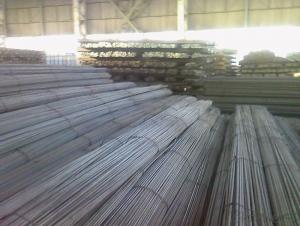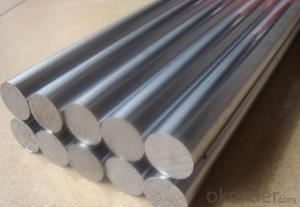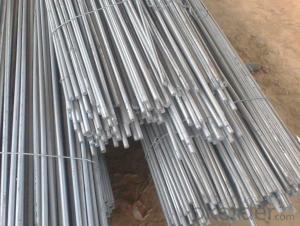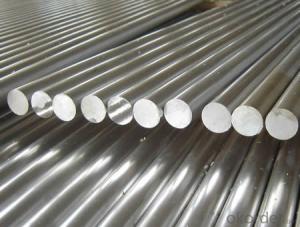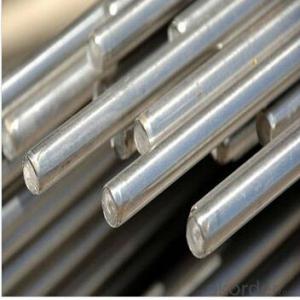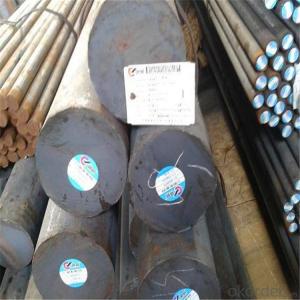Forged Spring Steel Round Bar with the Size 20mm
- Loading Port:
- Shanghai
- Payment Terms:
- TT or LC
- Min Order Qty:
- 20 m.t.
- Supply Capability:
- 500 m.t./month
OKorder Service Pledge
OKorder Financial Service
You Might Also Like
Product Description:
OKorder is offering Forged Spring Steel Round Bar with the Size 20mm at great prices with worldwide shipping. Our supplier is a world-class manufacturer of steel, with our products utilized the world over. OKorder annually supplies products to European, North American and Asian markets. We provide quotations within 24 hours of receiving an inquiry and guarantee competitive prices.
Product Applications:
Forged Spring Steel Round Bar with the Size 20mm is widely used to make the bearing used in automobile, tractor engine, transmission and the wheel. And it also used to make the main bearing for the machine tools, electrical machinery, mining machinery, electric locomotives,mechanical ventilation and high speed of grinding wheel spindle etc
Product Advantages:
OKorder's Forged Spring Steel Round Bar with the Size 20mm with High Quality are durable, diversified and qualified.
Main Product Features:
· Premium quality
· Prompt delivery & seaworthy packing (30 days after receiving deposit)
· Can be recycled and reused
· Mill test certification
· Professional Service
· Competitive pricing
Product Specifications:
Manufacture: Hot rolled
Grade: 20CrNiMoA 20CrNi2MoA 16Cr2Ni4MoA 12Cr2Ni3Mo5A 20Cr2Ni4A 20Cr2Ni2MoA
Cr4Mo4V Cr15Mo4 W9Cr4V2Mo W18Cr4V W6Mo5Cr4V2 5CrMnMo 60CrMnMoNi 37CrA 55SiMoVA etc
Certificates: ISO, SGS, BV, CIQ
Length:6m 8m 9m 12m
Packaging: Packed in bundles with standard export sea-worthy package or as customer require
FAQ:
Q1: Why buy Materials & Equipment from OKorder.com?
A1: All products offered byOKorder.com are carefully selected from China's most reliable manufacturing enterprises. Through its ISO certifications, OKorder.com adheres to the highest standards and a commitment to supply chain safety and customer satisfaction.
Q2: How do we guarantee the quality of our products?
A2: We have established an advanced quality management system which conducts strict quality tests at every step, from raw materials to the final product. At the same time, we provide extensive follow-up service assurances as required.
Q3: How soon can we receive the product after purchase?
A3: Within three days of placing an order, we will begin production. The specific shipping date is dependent upon international and government factors, but is typically 7 to 10 workdays.
Q4: How many types of bearing steel that OKorder.com can supply?
A4: Two types, carbon spring steel and alloy spring steel
Images:
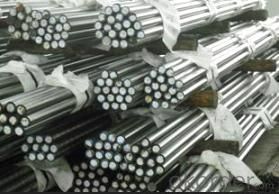
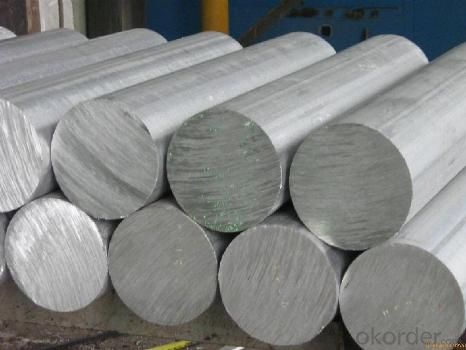
- Q: What are the advantages of using special steel in manufacturing?
- Special steel in manufacturing offers several advantages. Firstly, it provides a higher level of strength and durability compared to regular steel. This is because of the presence of alloying elements, like chromium, nickel, and manganese, which enhance its mechanical properties. As a result, special steel can withstand heavy loads, resist wear and tear, and endure extreme conditions, making it ideal for manufacturing applications requiring strength and longevity. Secondly, special steel exhibits excellent corrosion resistance. The addition of elements like chromium forms a protective oxide layer on the steel's surface, preventing rusting and corrosion when exposed to moisture or harsh environments. This corrosion resistance is crucial in industries such as marine, automotive, and construction, where materials face constant exposure to water, salt, and chemicals. Furthermore, special steel possesses exceptional heat resistance and heat transfer properties. These properties are vital in manufacturing processes involving high temperatures, such as forging, casting, and heat treatment. Special steel retains its strength and structural integrity even at elevated temperatures, enabling the production of components capable of withstanding extreme heat conditions. Another advantage of using special steel in manufacturing is its versatility. It can be easily customized and tailored to specific requirements. Manufacturers can modify it to exhibit various mechanical properties, including hardness, toughness, or flexibility, depending on the application. This flexibility allows for the development of components with precise characteristics, ensuring optimal performance and efficiency. Lastly, special steel proves to be more cost-effective in the long run. Although initial costs may be higher than regular steel, its superior durability and longevity result in reduced maintenance and replacement costs. Additionally, the enhanced properties of special steel can lead to improved energy efficiency and reduced material waste, contributing to overall cost savings in the manufacturing process. In conclusion, the utilization of special steel in manufacturing brings forth benefits such as increased strength and durability, excellent corrosion resistance, superior heat resistance, versatility, and long-term cost-effectiveness. These advantages make it the preferred choice for various industries, guaranteeing the production of high-quality and reliable components.
- Q: What are the different power generation grades of special steel?
- Within the power generation industry, there are numerous grades of special steel used for different applications. These grades are specifically engineered to withstand the extreme conditions encountered in power plants, including high temperatures, pressures, and corrosive environments. One widely used grade is 9Cr-1Mo-V steel, also referred to as Grade 91. This high-strength, low-alloy steel is commonly employed in the construction of boiler components such as headers, tubes, and turbine rotors. Grade 91 steel offers exceptional creep strength, oxidation resistance, and thermal stability, making it well-suited for operations at elevated temperatures. Another commonly utilized grade in power generation is 12Cr-1Mo-V steel, also known as Grade 11. It finds primary application in the fabrication of superheater and reheater tubes for power boilers. Grade 11 steel exhibits good strength at high temperatures, corrosion resistance, and weldability, which makes it an ideal choice for these specific purposes. Furthermore, the power generation industry often employs a grade called 2.25Cr-1Mo steel, or Grade 22, in the construction of pressure vessels and piping systems within power plants. This grade is highly regarded for its outstanding resistance to creep, high-temperature strength, and ability to withstand hydrogen attack. It is therefore deemed suitable for critical components within power generation facilities. Moreover, there exist other specialized grades such as 5Cr-0.5Mo steel, or Grade 5, and 9Cr-0.5Mo steel, or Grade 9, which find application in specific power generation scenarios involving elevated temperatures and pressures. These grades offer a combination of strength, corrosion resistance, and thermal stability, ensuring dependable performance in demanding environments. In conclusion, the power generation industry relies on a variety of special steel grades that are specifically tailored to meet the unique requirements of power plants. These grades possess crucial properties such as high-temperature strength, corrosion resistance, and more, which are essential for efficient and reliable power generation operations.
- Q: What are the applications of special steel in the railway industry?
- Special steel has various applications in the railway industry, primarily due to its exceptional strength, durability, and resistance to extreme conditions. It is commonly used in the manufacturing of railway tracks, ensuring their longevity and ability to withstand heavy loads and frequent train traffic. Special steel is also employed in the production of railway wheels and axles, providing enhanced wear resistance and improved performance. Additionally, it is utilized in the construction of railway bridges and tunnels, where its high tensile strength and corrosion resistance are crucial for maintaining structural integrity and safety.
- Q: What are the main factors affecting the strength of special steel?
- The main factors affecting the strength of special steel are the composition of alloying elements, heat treatment processes, and the grain size of the steel.
- Q: What are the properties of magnetic stainless steel?
- Magnetic stainless steel is a type of stainless steel that exhibits magnetic properties due to its high iron content. It possesses good corrosion resistance, durability, and high strength, making it suitable for various applications. Additionally, it is easily formable and weldable, allowing for versatility in manufacturing processes.
- Q: How is corrosion-resistant steel used in marine environments?
- Corrosion-resistant steel is commonly used in marine environments due to its ability to withstand the harsh conditions of saltwater and prevent corrosion. It is utilized in the construction of ships, offshore platforms, and various marine structures. The steel's high resistance to corrosion prolongs the lifespan of these structures, ensuring their durability and safety in challenging marine environments.
- Q: How long does special steel last compared to regular steel?
- Due to its unique composition and properties, special steel tends to have a longer lifespan than regular steel. Regular steel primarily consists of iron and carbon, while special steel is alloyed with elements like chromium, nickel, and molybdenum to enhance its strength, hardness, and resistance to corrosion. The lifespan of special steel is influenced by factors such as the specific type of steel, its usage conditions, and maintenance practices. However, in general, special steel has a significantly longer lifespan compared to regular steel. It exhibits greater resistance to wear and tear, corrosion, and high temperatures, making it suitable for demanding applications and environments. Industries such as aerospace, automotive, and construction extensively utilize special steel for critical components like engine parts, structural elements, and cutting tools. These components often endure high stress, friction, and exposure to harsh conditions. Special steel's exceptional properties enable it to withstand these challenges and maintain its performance for an extended period. Furthermore, special steel undergoes rigorous testing and quality control measures during its manufacturing process. This ensures that it meets specific industry standards and can endure extreme conditions without significant degradation. In contrast, regular steel may not possess the same level of durability or longevity. In conclusion, special steel generally lasts longer than regular steel due to its enhanced properties and resistance to wear, corrosion, and high temperatures. Although the exact lifespan may vary depending on various factors, special steel's superior characteristics contribute to its prolonged durability.
- Q: What are the main applications of special steel in the mining processing?
- Special steel is widely used in mining processing due to its superior strength, durability, and resistance to extreme conditions. It is primarily used in the manufacturing of mining equipment such as crushers, conveyors, and drilling machines. Special steel is also utilized in the construction of mining infrastructure, including tunnels, shafts, and support structures. Additionally, it is employed in the production of wear-resistant components, such as grinding balls and liners, which are crucial for efficient ore processing. Overall, special steel plays a vital role in enhancing the productivity, efficiency, and safety of mining operations.
- Q: What are the applications of special steel in the manufacturing supply chain?
- Special steel has a wide range of applications in the manufacturing supply chain. It is commonly used in the production of machinery, tools, and equipment due to its exceptional strength, durability, and resistance to wear and corrosion. Special steel is also utilized in the automotive and aerospace industries for components that require high performance and reliability. Additionally, it finds use in construction, energy, and defense sectors, among others. Overall, special steel plays a crucial role in enhancing the quality and efficiency of various manufacturing processes and end products.
- Q: How does special steel perform in high-stress applications?
- Special steel performs exceptionally well in high-stress applications due to its superior strength, durability, and resistance to corrosion and wear. Its unique composition and precise manufacturing process make it capable of withstanding extreme conditions, such as heavy loads, high temperatures, and intense pressure. As a result, special steel ensures optimal performance, reliability, and longevity in critical industries like aerospace, automotive, oil and gas, and construction.
Send your message to us
Forged Spring Steel Round Bar with the Size 20mm
- Loading Port:
- Shanghai
- Payment Terms:
- TT or LC
- Min Order Qty:
- 20 m.t.
- Supply Capability:
- 500 m.t./month
OKorder Service Pledge
OKorder Financial Service
Similar products
Hot products
Hot Searches
Related keywords
